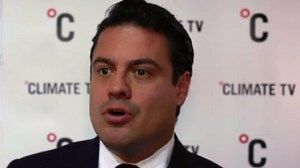Paris, France - During COP21 in Paris, Aristóteles Sandoval, Governor of the State of Jalisco in Mexico outlined how the state is investing in a low carbon energy future and sharing its experiences with other governments around the world to spread the economic benefits of climate action, in an exclusive interview with The Climate Group's Climate TV.
Going through Jalisco's low carbon priorities in the interview filmed at COP21, the Governor points out that the Mexican state's high sunshine levels make solar power a clear option, but that updating its public transport is also reaping significant environmental benefits for its population of 7.8 million.
"It is very important for us to establish a strategy and a specific agenda that promotes low emission development in our state. Regarding energy, we are stimulating clean energy consumption such as wind energy. We have 290 sunny days a year, so solar energy is an option. We are also exploring geothermal energy.
"We are renovating our public transportation – promoting non-motorized transportation, investing in new metro lines – and this will have an impact on reducing almost 18,000 tons of greenhouse gas emissions per year, while improving mobility."
 |
Explaining how recovering natural areas such as forests has also brought "positive dividends" to Jalisco state, Governor Aristóteles Sandoval believes stricter environmental regulations have allowed it to progress such efforts. "Today we have a more harmonized economic development, there is a specific law in the matter that everyone must respect, and this has led us to commit to reduce our emissions 30% by 2030 and on 50% by 2050."
But while focusing all efforts on domestic laws designed for the region is important, it is by sharing innovative policy experiences with other sub-national governments around the world that low carbon actions can really be scaled up in the most effective way, according to Governor Sandoval.
Jalisco is the only full participant from Mexico in the Compact of States and Regions, a pioneering sub-national government climate reporting platform which last week announced collective emission reduction targets equal to the annual output of China.
Talking about the opportunities of the transparent data reporting and knowledge-sharing available in the Compact, he concluded in the Climate TV interview: "For us this issue is very important because it is followed up, it is being evaluated and it also transfers knowledge – we can learn from other governments. We can orient and concentrate our efforts with experiences of the path that we have already walked. That is why we joined this vision and we will continue reporting our emissions."
Learn more about the States & Regions Alliance


